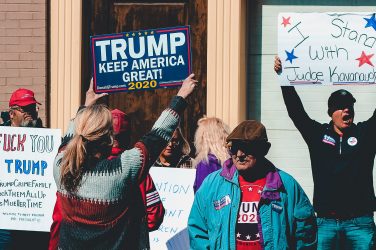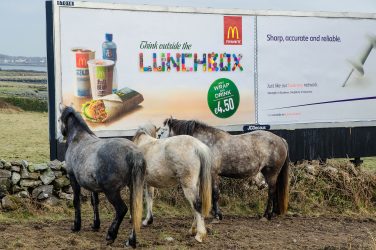As the next exiting date for the UK to leave the European Union is stedily approaching, our author Allison Wetley has a closer look at the country’s future in trade. What relationship will the UK and the US establish? Will the US become UK’s biggest trading partner after Brexit, just as Donald Trump predicts it? What cosequences will it have for the Britain?
In the 1980s film Wall Street, Michael Douglas plays Gordon Gekko, a wealthy and overly-ambitious stockbroker willing to make money by any means necessary. In one of the most famous scenes, he stands before a room of stockholders and gives an impassioned speech in which he says, “Greed, for lack of a better word, is good. Greed is right. Greed works. Greed clarifies, cuts through and captures the essence of the evolutionary spirit. Greed in all of its forms – greed for life, for money, for love, knowledge has marked the upward surge of mankind. And greed, you mark my words, will not only save Telgard paper, but that other malfunctioning corporation called the USA.” Many in the US at the time saw the film as aspirational and sought to live as Gordon Gekko with a new mandate to believe in wealth above all else. And the so-called Special Relationship between the US and the UK, once bound by the drive to eradicate fascism, is now bound by greed. 20 years later, this bond defied the world and invaded Iraq. 30 years later, this bond facilitated the greatest economic crisis since the Great Depression and 40 years later, greed sough to dismantle the European Union and Donald Trump, a nightmarish caricature of this lifestyle, to the presidency.
The European Union is famously one of the most heavily regulated economies in the world. From food, transportation, technology, taxes, and the environment, these regulations impact almost every aspect of life for the nearly 500 million people living in the EU. And while these regulations are designed to protect the health and safety of consumers, industry leaders have long fought against these regulations as barriers between themselves and even greater wealth by falsely claiming that regulation stifles growth and innovation, and using ‘voodoo economics’ to justify their dangerous policies.
Leaving the EU and its customs union not only means doing away with most of this regulation, but it also opens up the necessity of greater trade with the US.
For many of the Leave campaign’s most prominent donors, a more encompassing agreement with the US was the goal all along. The US has been steadily deregulating its economy for decades and this process has been greatly accelerated since Donald Trump took office in 2017. He and his previous majority in Congress have spent the last three years significantly overturning consumer protections and Obama-era regulatory policy for nearly every industry. They have placed former industry executives at the head of regulatory agencies tasked with enforcing what little regulation remains. And they famously overhauled the tax system to result in an unprecedented windfall for some of the country’s wealthiest individuals. The US is now a haven for greed, and the UK wants in.
So it is not surprising that many of these same people who supported Trump’s path were also flooding the Leave campaign with money and support. Wealthy donors like Robert Mercer, who donated to both Leave and Trump, and Arron Banks stand to profit greatly from both a lack of regulation promised by Brexit and by narrowly avoiding the EU’s Anti Tax Avoidance Directive that was passed prior to the referendum in 2016 and takes effect this year. So while the economic insecurities of the middle class and divisive, xenophobic campaigns explain how the Brexit vote and the election of Donald Trump managed to succeed in upending a stable international order, promises of deregulation and the greed of a few individuals more accurately explain why these events happened at all.
In early March, the office of United States Trade Representative Robert Lighthizer released its demands for a post-Brexit trade agreement and sparked widespread outrage about how it seeks to change food and drug safety standards in order to export grater amounts of US agricultural products and pharmaceuticals to the UK market. Somewhat more troubling, however, is how the hardline demands of the US reveal just how little power the UK holds to negotiate fair agreements if it steps out into the global economy alone. As a member state, the UK is signed onto 40 trade agreements with third countries, and it needs to maintain similar arrangements if it hopes to avoid a recession or major economic disruption once it leaves the single market. To date, International Trade Secretary, Liam Fox has negotiated only 11 of the possible 40, and it remains to be seen who, if anyone, is willing to endanger its relationship with the EU in favor of trade with the UK. And even if the UK manages to leave without remaining in the customs union, it will never be able to “take back control” of its trade policy as promised, simply because it is far too small to negotiate a fair settlement on its own. Rather, it will likely have no option but to replace the EU with another large economy like the US or China and will be pressured to abide by their regulatory practice.
For now it seems as though the UK is hedging its bets on greater trade with the US. The Guardian reported in March that the foreign secretary’s office purchased a £12 million New York City penthouse as the new residence for the UK trade commissioner for North America, Antony Phillipson. And if increased trade with the US becomes reality, it is likely that this radical disconnection between austerity for citizens and opulence for government officials and their wealthy friends will only increase in the UK as it has in the US.
The US wants to “secure comprehensive market access” to the UK’s agricultural market and aims to change food safety standards to do so. Reports of chlorinated chicken, hormone and anti-biotic laced beef, and mysteriously engineered crops have drawn widespread attention for good reason. Food and safety standards in the US are disturbingly lax. Just this week, one of the largest frozen food manufacturers, Tyson Foods Inc, was forced to recall almost 70,000 pound of frozen chicken strips after the US Department of Agriculture confirmed the presence of metal in the food. The company is the largest producer of chicken products in the United States and has been embroiled in controversy over its treatment of chickens and farmers in recent years. And as the Guardian reported, the UK has recognized the sentience of animals since 1875, and has introduced a number of its own independent regulations to protect the welfare of animals that in fact nudged the EU to adopt stronger protections. In the US, documentary filmmakers have brutally exposed the poor conditions of American livestock, to their own detriment.
Rather than change legislation to address concerns over animal welfare and food safety, the US has chosen to overwhelmingly prosecute animal rights’ activists as domestic terrorists.
The US also hopes to change how the NHS sources its pharmaceuticals, and Theresa May has refused attempts to limit US access to NHS contracts. The fight for a universal health care system similar to the NHS has been long and difficult for the US, in part because our pharmaceutical companies and health insurance providers wield so much influence in Washington. Trump has long argued the UK and other European countries do not pay their fair share of the costly research and development it takes to produce new drug treatments. In reality, US drug companies consistently spend more on marketing than research and development and European countries often pay less for US medication because they are simply able to negotiate better contracts without the influence of for-profit companies that drive up prices. And while the summary of US trade demands is purposefully vague in regard to its plans for healthcare, a deal is almost guaranteed to increase drug pricing and access for the NHS and further cripple the agency.

However, while the US is still hoping for an agreement on their own terms, so much has changed since these demands were initially made. Donald Trump’s recent state visit to the UK was discussed primarily in terms of its potential to form an agreement. During the meeting, Trump and his team once again demanded complete access to the NHS as the basis for any future deal. And US Secretary of State, Mike Pompeo, promised a ‘free-trade’ agreement that would seek to replace the EU as the UK’s largest trading partner if they leave the EU without a deal. The problem, of course, is that trade with the increasingly unpredictable Trump administration is deeply risky. The US recently waged a tariff war with China that has already threatened American farmers. And not only has Trump threatened additional trade wars with Mexico, sought to end agreements like NAFTA without any replacement. And this is all not to mention how a deal would permanently tie the UK to the potentially disastrous war the US is currently instigating with Iran.
The race to replace Theresa May also furthers the likelihood of a special relationship far greedier than the Gordon Gekko era of Reagan and Thatcher, and with infinitely worse hair. Boris Johnson, the front-runner to become the Next Prime Minister, has already used his former position as Foreign Secretary to befriend the Trump administration in hopes of striking a deal after the no-deal Brexit he seems intent on delivering. Potentially more devastating to Britain’s economy, however, is how Johnson plans to emulate the tax cuts for the wealthy and massive deregulation Trump has delivered to the US.
It remains to be seen who the next PM will be, or if and how they manage to leave the European Union. However, many are predicted the next recession regardless, this time with London as the epicenter. The US has seemingly infected the UK with its love of consumer debt, unsustainably high costs of living at a time of stagnant wages, and it is very likely the deregulation and high-income tax cuts in both countries could extend the crisis far beyond that of 2008, suggesting it might be time to stop viewing the once Special Relationship as a mandate for the global order, and instead view it for the suicide pact it has become.
Cover photo: frank mckenna (Unsplash), C00










